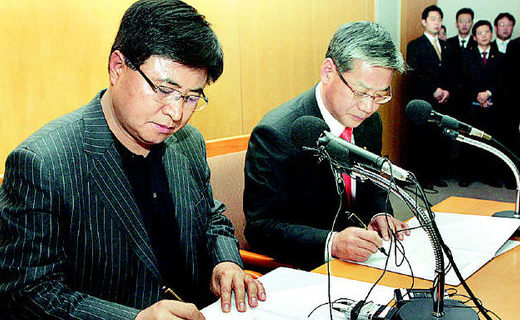 |
|
Woori president Hwang Young-key (right) and labor union chairperson Ma Ho-woong
|
Landmark decision expected to have ripple effect in Korean financial industry
For the first time in Korea’s financial industry, labor and management of a bank have agreed to give part-time workers the same benefits as regular workers. The decision at Woori Bank, the nation’s third-largest lender, is likely to affect all of the nation’s financial institutions. At a conference on December 20, Woori president Hwang Young-key and labor union chairperson Ma Ho-woong said that the two sides had agreed to grant ’regular worker’ status to part-time employees beginning in March next year, on condition that the salaries of regular workers be frozen for the time being. Woori Bank’s number of part-time and short-term workers (known as "non-regular workers" in Korean) stands at about 3,100, or 28 percent out of the bank’s total staff of 11,000. Most of these workers are in charge of marketing. Under the agreement, these workers will receive the same treatment as regular employees in terms of job security and benefits. There have been individual cases where some high-performing part-time workers were granted regular worker status, but this is the first time at a Korean financial institution that this entire category of workers will, in effect, be converted into regular employees through a labor-management agreement."As the agreement has been reached on the condition of freezing the wages of the regular workers, productivity and marketing power will be strengthened due to stronger unity among workers," said Hwang. "I hope Woori Bank’s case will become the cornerstone of a trend of converting non-regular workers into regular ones," Ma said. Indeed, the banking industry expects other banks will also try to resolve the plight of the part-time worker. An official of another commercial bank said, "Our bank has not considered changing the status of all of our non-regular workers, but I think things may be affected by Woori Bank’s decision." When Korean banks were hit by the 1997-98 financial crisis, many laid off a massive number of employees. In the aftermath, banks secured part-time and short-term workers and provided them with less benefits. At Kookmin Bank, Korea’s largest lender, temporary-style workers account for 32 percent of its workforce, and at Shinhan Bank, Korea’s second largest lender, short-term workers amount to 16.6 percent of its employees. The Korean Financial Industry Union (KFIU), an umbrella group of labor unions of 35 financial institutions, plans to expand discussions to the whole industry. Lee Seung-min, an official of the KFIU, said, "Such a move is very meaningful in that the welfare and job stability of non-regular workers have been dramatically improved." Please direct questions or comments to [englishhani@hani.co.kr]





